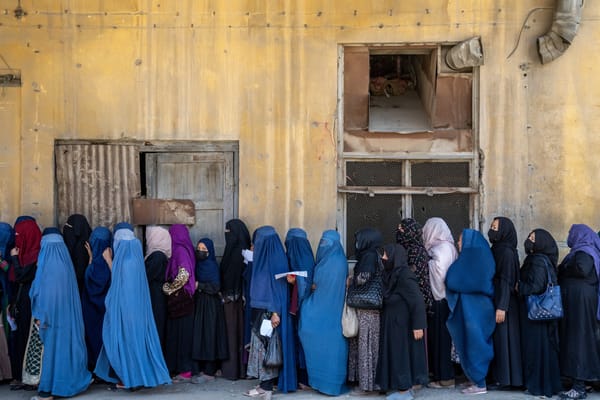‘Ethical IVF’ May Be the Problematic Solution to Donald Trump’s IVF Dilemma
By supporting IVF, Trump drove a wedge between two factions of his followers. So-called “ethical IVF” may be how he stitches them back together.

In February, Donald Trump signed an executive order promising to improve access to IVF for Americans.
The order, which asked his team to come up with “a list of policy recommendations on protecting IVF access and aggressively reducing out-of-pocket and health plan costs for IVF treatment” pitted two groups of his most ardent supporters against one another. On one side, the evangelical followers, who have become increasingly vocal about their opposition to IVF. On the other, the pronatalist movement—which counts among its champions the likes of Elon Musk and J.D. Vance—who are fans of IVF technology because of its potential to increase birth rates in the U.S. which have been declining for years.
Both are important supporters for Trump. Both want their way.
How will he reconcile the two sides of the argument? While we won’t know until the White House delivers its plans, there are signs of what IVF might look like under the Trump administration. But first, let’s go back…
IVF: An Overview
When a woman is undergoing IVF, a cocktail of drugs cause her ovaries to release multiple eggs (on average between 8 and 14) which, hopefully, will create multiple embryos. Embryos are transferred into the woman’s uterus one or two at a time in the hopes they’ll go on to become a pregnancy; the rest are frozen and stored at minus 321 degrees in large tanks of liquid nitrogen at the clinic, ready for future rounds.
Right now, there are an estimated 1.5 million frozen embryos in the U.S., way more than will actually become babies, because the process is highly inefficient—and that’s putting it generously. Between 40% and 60% of human embryos are lost before birth, either because they never implant into the uterine lining after being transferred, or through miscarriage.
Given these odds, it makes sense that the more embryos you have, the better your chances of conceiving. And if you’re going to go through the effort, while investing time and money—not to mention putting up with the discomfort—of an IVF cycle, then collecting multiple eggs and creating multiple embryos at the same time is by far the most logical, financially efficient, and least traumatizing thing to do. When a couple or individual has finished creating their family, surplus embryos are usually destroyed.
But for a certain group of evangelical Christians, this process is unacceptable—specifically the part about freezing, then potentially destroying, multiple embryos. This view was demonstrated by Alabama’s Supreme Court last year, which used a 19th Century statute to rule that three couples’ embryos which were accidentally destroyed at an IVF clinic in the state were considered “children” under the law—meaning they suffered “wrongful deaths.”
The ruling caused widespread panic among IVF clinics in the state. Some shut their doors altogether.
Enter ‘Ethical’ IVF
In a trick of artful branding, the pro-life movement has come up with a solution for the dilemma of IVF. They call it “ethical IVF.”
Under this idea, couples that undergo IVF would either be required to create just one embryo, or a limited number at a time. Any unused embryos they’d be forced to donate to other couples, in a process called “embryo adoption.” This could either lengthen the IVF process by years as couples attempt to create and use embryos one by one, or force people to go through life knowing they have biological children who are being raised by another family. And children conceived via IVF could have biological brothers and sisters they have never met.
In March, the Heritage Foundation, the right-wing think tank which authored Project 2025, thought to be the framework for Trump’s second presidency, produced a “report” calling for tax credits for couples who “adopt” others’ unused embryos, and legal limits for the amount of time people can store embryos. “After that time limit has passed, the embryos should be declared abandoned and they should be made available for adoption,” it said.
The Susan B Anthony Pro-Life America, one of America’s largest pro-life organizations, has echoed this, calling for an Alabama law “similar to Louisiana’s,” which bans the destruction of embryos.
Whichever shape Trump's IVF policy takes, it’s likely it will insist that IVF is covered by health insurance.
Back to Trump
The question is how Trump, the self-described “father of IVF” and “fertilization president,” who is so committed to increasing the birth rate that he, last month, considered the idea of paying women $5,000 per baby they birth, navigates a way forward that will please all his supporters.
As it turns out, “ethical IVF” could work as a solution for both sides. The pronatalists on board with the idea could get as many babies as they want—more, even, if people who otherwise couldn’t conceive are able to adopt embryos. The pro-lifers, meanwhile, could see an end to what they believe is the “abandonment” of embryos.
There’s another aspect to this. The Heritage Foundation, in particular, has historically been very keen to limit family-building to married, heterosexual, couples. Project 2025 repeatedly calls for strategies to promote marriage, and criticizes the “LGBTQ+ agenda.” Trump’s executive order stated that any policies that come out of it will be directed at one group: “loving and longing mothers and fathers”—implying heterosexual, married couples. It’s likely that LGBTQ+ couples and single people will not benefit.
Amy Friedrich-Karnik, director of federal policy at the Guttmacher Institute, told Mother Jones her organization was “deeply concerned that this administration may attempt to limit IVF access to only straight, married couples or otherwise discriminate against LGBTQ+ individuals and single parents.”
‘What Our Community Will Not Tolerate’
IVF advocacy groups are, understandably, worried. Resolve, which bills itself as America’s “National Infertility Association,” is clearly concerned about “ethical IVF” being adopted into law (though it has not mentioned the omission of LGBTQ+ people in Trump’s executive order).
In April, Resolve invited its followers to take a survey cheerily promising to use the results to help IVF patients “raise your voice all the way to the White House!” Screenshots of the survey, which closed within hours of being posted, show that one question asked participants: “If you decided to pursue IVF and only had the following two options, which would you select?” The options were either “IVF covered by health insurance, but you could not freeze any of your embryos” or “no IVF health insurance coverage, but you can freeze your embryos.”
After the survey was heavily criticized on Facebook (“I had to stop taking the survey, it freaked me out,” wrote one commenter), Resolve indicated that it was simply responding to concerns over what would come out of the Trump’s executive order. The organization said it had “created this survey to gather data to fight possible bad policies and the continued false narratives around IVF.”
“We know there is growing support for ‘IVF, but…<insert restrictions>,'” it wrote on Facebook. “This survey will show policy makers what our community will not tolerate.”
Resolve said on Facebook that it does not plan to release the results of the survey publicly. When I reached out to the organization twice for a statement, it did not respond.
Any or all of these proposals, if adopted, would have far-reaching implications. Not only would they likely cut out the estimated 5% to 10% patients who are LGBTQ+, as well as single people, but those who do qualify for whatever Trump is planning would face an almost impossible choice.
With one round of IVF priced at up to $30,000, for many it is drastically out of reach. If ethical IVF becomes the insurance-covered option, that would mean that for those who qualify, the only way to build your family might result in someone else raising a child who carries your genes. Even for those desperate to build a family, it may be one tradeoff too far.











